Material on Gender Equality in IVS
In this section you can consult and download useful materials and tools addressed to workcamp organizers, leaders, volunteers and trainers, on the issue of gender discrimination in IVS projects.
Gender Equality Toolkit for Campleaders
The Gender Equality Toolkit for Camp Leaders was created by 26 young volunteers and camp leaders from 13 different voluntary service organisations during the Erasmus+ project P.R.O.U.D. (“Promoting Rights and Opportunities to Understand Diversity”) in 2020. The project was coordinated by the ALLIANCE Gender Equality Working Group and organized by Solidarités Jeunesses in Laguépie, France. The toolkit is meant for all group leaders, trainers, facilitators and youth workers who are interested in learning more about gender equality and how to deal with gender-based conflicts or issues in workcamps.
You can find the P.R.O.U.D. Toolkit at this link.
Gender Equality Working Group
Find here the results of the survey we conducted last year on the gender equality topic in the network. The results are also available as infographics.
External materials collected and reviewed by GEWG
We will post in this section some materials that we found and consider significant on the gender equality topic and that can help you spread information, support communication documents on the topic, find activities to do on your workcamps… Sky is your limit! Before the documents descriptions, you will sometimes see appearing the acronyms CW or TW, they stand for “Caution Warning” and “Trigger Warning”. They are used to caution or warn readers about a feature in the document which can hurt them, trigger some feelings from a traumatic situation that happened to them before, or simply include details that they would rather not read about at the moment and come back to at another time.
Seminar combatting sexist hate speech (2016, 54 pages)
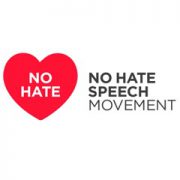
The Council of Europe Seminar, in collaboration with the No Hate Speech Movement, was held from the 10th to the 12th of February 2016 in Strasbourg and brought together a group of 60 people, including human right and women right activists, youth leaders, journalists and policy makers to challenge sexist hate speech, its causes and consequences and to propose solution to counter it.
The pot of Gold Toolkit – Education and exchange to fight hate speech and discrimination (2016, 62 pages)

This toolkit is part of the outcomes of the Erasmus+ training course The Pot of Gold- Education and exchange to fight hate speech and discrimination, held by Lunaria and Artemide associations in Orvieto in 2016. It contains the tools used during the training week, where the participants had the chance to experiment new methodologies to combat hate speech towards the LGBTQI+ community and individuals.
WEF Global Gender Gap Report (2016, 391 pages)
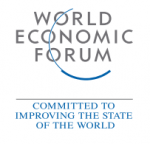
The report is focusing on national gender gaps on economic, health, education, political effectiveness and provides country profile in order to create concrete comparisons between countries. There are two parts of this report: first part is about the methodologies to measure gender gaps of countries, 2016 results of countries overall and some notable country cases to focus more. Second part of this report consists of country profiles which shows specific weaknesses and strengths of each country’s about gender-based gaps.The indicators are divided into four groups: economic participation and opportunity, educational attainment, health and survival and political empowerment. Global Gender Gap Index in 2016 was calculated for 144 countries. Each country’s profile shows the score (0-to-1) and rank of the country in the list as well as key demographic and economic indicators and details on each of the 14 indicators that are used to build the Global Gender Gap Index. Overall this report is important as an indicator for us to realize how equal men and women are in everyday life, having a detailed look at the most common areas of inequality. It also shows us what to focus on to close the gender gap in the future.
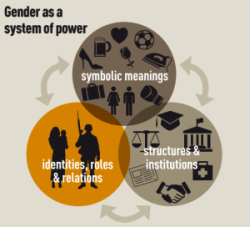
Gender & conflict analysis toolkit for peacebuilders (2015, 62 pages)
This toolkit, first published in 2015 by the organization Conciliation Resources, provides practical guidance to peacebuilding practitioners on using gender and conflict analysis. It consists of an exploration of the concept of gender, a list of guiding questions on gender sensitive conflict analysis (including some examples of conciliation resources approach in practice, in the Mindanao peace process and in the South Caucasus) and a set of developed practical exercises.
Because of who I am (2013, 16 pages)
TW interpersonal and institutional violences against people from the LGBTIQ+ community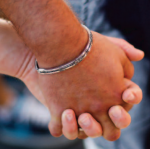
This document is a collection of stories by LGBTIQ+ people across Europe, about the violences and injustices they face because of their gender identity and/or sexual orientation. Because of those discrimination, prejudice and violence, many people in Europe continue to hide their sexual orientation and gender identity, including from colleagues, friends, schoolmates and family members. Published in 2013 by Amnesty International, this report is crucial to help understanding that although LGBTIQ+ rights are progressing everywhere, people with non-normative identifications can still be endangered simply by expressing themselves and living freely.
Gender matters: a manual on addressing gender-based violence affecting young people (2007, 174 pages)
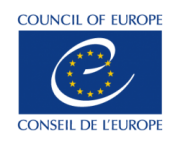
GENDER MATTERS is a very powerful and useful tool, produced by the Council of Europe Youth Department, to use when approaching the thematic of gender and gender based violence in youth work, having a feminist and gender-equal point of view. It gives a lot of food for thought on the issue, plus it gives a general overview about all the topics correlated to the theme, which are well tackled in this handbook. It’s very interesting the fact that it uses a lot of case studies as examples, giving the reader the opportunity to search for more about it. Even though it talks also about different gender identities, it still stays a little bit too much on the binary dichotomy of male and female. Regardless of this weakness, the activities and good practices proposed can be readapted in many ways. This handbook is the best tool to use if it’s the first time you are handling this topic, giving many references and useful annexes.
Toolkit to work on the rights regarding Gender, Sexuality and Bodily Autonomy in international workcamps (2016, 49 pages)
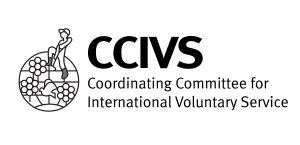
This toolkit has been developed under Laboratory of Tools and Skills for Peace-Builders, which was organized by CCIVS network (Coordinating Committee of International Voluntary Service) with the support of the Council of Europe. CCIVS has a long-lasting campaign – Raising Peace Campaign – which is focused on three methods for change (Empowerment, Action and Advocacy) in three thematic areas. One of these areas is Rights related to Gender, Sexuality and Body. In this toolkit you can get informed on different methods and activities which could be used in International Voluntary Service and these methods could be tool for empowering topic such as gender, sexuality and body in these kind of events. There is variety of methods depending on the level of knowledge of the group and each activity is explained in details. At the very end there are guidelines which are useful to take into account for workcamps and which could be helpful in conflict situation or for educational purposes.
